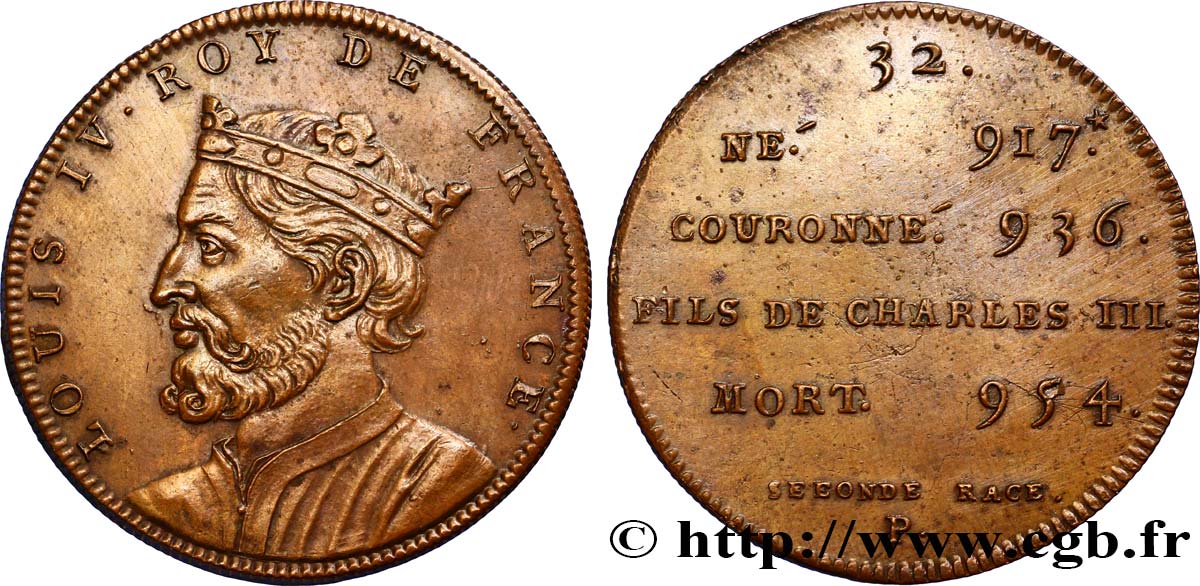E-auction 103-54517 - fjt_251695 - SÉRIE MÉTALLIQUE DES ROIS DE FRANCE Règne de LOUIS IV - 32 - frappe d’origine, légère n.d.
得先注册又得到批准才可以报价。为了报价注册. 客户应该得到公司允许,那种过程需要 48 个小时。别等出售结束那一天才登记。您报价的话等于您赞成买那物品,而且按« 保价 » 证明您接受 cgb.fr 因特网拍卖使用法.
报价时只可以出全数值欧元总额。物品描述也说明销售结束时间,结束后出价都不会生效。 报价命令转达有时变动,等到最后秒钟增加否决的可能会。想多了解的话请注意 因特网拍卖常问
购货人不付费
购货人不付费
| 估算 : | 35 € |
| 价格 : | 28 € |
| 最高出价 : | 35 € |
| 拍卖结束日期 : | 06 April 2015 18:41:30 |
| 竞拍人 : | 6 竞拍人 |
种类 Règne de LOUIS IV - 32 - frappe d’origine, légère
日期: n.d.
材质 red copper
直径 32 mm
模子方针 12 h.
重量 11,83 g.
侧面 cannelée
稀少度 R1
正面
正面的文字 LOUIS IV ROY DE FRANCE.
正面的说明书 Buste imaginaire couronné et drapé à gauche.
背面
背面的文字 32 - NÉ 917* - COURONNÉ 936 - FILS DE CHARLES III - MORT 954 - SECONDE RACE / P..
背面的说明书 en huit lignes.
评论
Louis IV dit d'Outremer (10 septembre 920 ou 921 – 10 septembre 954, Reims), fils de Charles III le Simple et d'Edwige de Wessex, est un roi des Francs (936-954) de la dynastie carolingienne.
Après la déchéance en 922 de son père le roi Charles III le Simple, sa mère et le prince Louis, âgé de deux ans, se réfugient en Angleterre (d’où son surnom d’Outremer), à la cour de son grand-père maternel Édouard l'Ancien, puis à celle de son oncle Æthelstan, rois de Wessex. Devenu l'héritier carolingien par la mort en captivité de Charles III (929), il est rappelé d'Angleterre par le puissant marquis de Neustrie Hugues le Grand afin de succéder au roi Raoul mort au début de l'année 936, laquelle marque alors le retour de la dynastie carolingienne.
Son règne riche en rebondissements nous est avant tout connu par les Annales de Flodoard puis plus tardivement par les Histoires de Richer de Reims. Une fois au pouvoir, Louis d'Outremer souhaite s'éloigner de Hugues le Grand devenu duc des Francs et seconde personnalité du royaume après le roi. Dans un premier temps il se lance à la conquête de la Lotharingie (939). Cette expédition est un échec et son beau-frère Otton Ier ne tarde pas à le soumettre en assiégeant la cité de Reims (940). Dans un second temps, après la mort du comte des Normands Guillaume Longue Epée, Louis IV tente de prendre à son compte le gouvernement de Normandie mais il est kidnappé par les hommes de Hugues le Grand (945).
Pour la suite de la biographie, voir http://fr.wikipedia.org/wiki/Louis_IV_de_France.
Louis IV, known as Louis d'Outremer (10 September 920 or 921 – 10 September 954, Reims), son of Charles III the Simple and Hedwig of Wessex, was a king of the Franks (936-954) of the Carolingian dynasty.
After the fall of his father, King Charles III the Simple, in 922, his mother and the two-year-old Prince Louis took refuge in England (hence his nickname Outremer), at the court of his maternal grandfather Edward the Elder, then at that of his uncle Æthelstan, King of Wessex.. Having become the Carolingian heir following the death in captivity of Charles III (929), he was recalled from England by the powerful Marquis of Neustria, Hugh the Great, in order to succeed King Raoul, who had died at the beginning of 936, which marked the return of the Carolingian dynasty..
His reign, rich in twists and turns, is known to us first and foremost through the Annals of Flodoard and later through the Histories of Richer of Reims.. Once in power, Louis d'Outremer wanted to distance himself from Hugh the Great, who had become Duke of the Franks and second most important figure in the kingdom after the king.. First he set out to conquer Lotharingia (939). This expedition was a failure and his brother-in-law Otto I was quick to subdue him by besieging the city of Reims (940). Later, after the death of the Count of Normandy, William Longsword, Louis IV attempted to take over the government of Normandy but was kidnapped by the men of Hugh the Great (945)..
For the rest of the biography, see http://fr. Wikipedia. org/wiki/Louis_IV_of_France
Après la déchéance en 922 de son père le roi Charles III le Simple, sa mère et le prince Louis, âgé de deux ans, se réfugient en Angleterre (d’où son surnom d’Outremer), à la cour de son grand-père maternel Édouard l'Ancien, puis à celle de son oncle Æthelstan, rois de Wessex. Devenu l'héritier carolingien par la mort en captivité de Charles III (929), il est rappelé d'Angleterre par le puissant marquis de Neustrie Hugues le Grand afin de succéder au roi Raoul mort au début de l'année 936, laquelle marque alors le retour de la dynastie carolingienne.
Son règne riche en rebondissements nous est avant tout connu par les Annales de Flodoard puis plus tardivement par les Histoires de Richer de Reims. Une fois au pouvoir, Louis d'Outremer souhaite s'éloigner de Hugues le Grand devenu duc des Francs et seconde personnalité du royaume après le roi. Dans un premier temps il se lance à la conquête de la Lotharingie (939). Cette expédition est un échec et son beau-frère Otton Ier ne tarde pas à le soumettre en assiégeant la cité de Reims (940). Dans un second temps, après la mort du comte des Normands Guillaume Longue Epée, Louis IV tente de prendre à son compte le gouvernement de Normandie mais il est kidnappé par les hommes de Hugues le Grand (945).
Pour la suite de la biographie, voir http://fr.wikipedia.org/wiki/Louis_IV_de_France.
Louis IV, known as Louis d'Outremer (10 September 920 or 921 – 10 September 954, Reims), son of Charles III the Simple and Hedwig of Wessex, was a king of the Franks (936-954) of the Carolingian dynasty.
After the fall of his father, King Charles III the Simple, in 922, his mother and the two-year-old Prince Louis took refuge in England (hence his nickname Outremer), at the court of his maternal grandfather Edward the Elder, then at that of his uncle Æthelstan, King of Wessex.. Having become the Carolingian heir following the death in captivity of Charles III (929), he was recalled from England by the powerful Marquis of Neustria, Hugh the Great, in order to succeed King Raoul, who had died at the beginning of 936, which marked the return of the Carolingian dynasty..
His reign, rich in twists and turns, is known to us first and foremost through the Annals of Flodoard and later through the Histories of Richer of Reims.. Once in power, Louis d'Outremer wanted to distance himself from Hugh the Great, who had become Duke of the Franks and second most important figure in the kingdom after the king.. First he set out to conquer Lotharingia (939). This expedition was a failure and his brother-in-law Otto I was quick to subdue him by besieging the city of Reims (940). Later, after the death of the Count of Normandy, William Longsword, Louis IV attempted to take over the government of Normandy but was kidnapped by the men of Hugh the Great (945)..
For the rest of the biography, see http://fr. Wikipedia. org/wiki/Louis_IV_of_France








 对产品描述纠错
对产品描述纠错 打印
打印 分享我的选择
分享我的选择 提问
提问 Consign / sell
Consign / sell
 产品介绍
产品介绍










